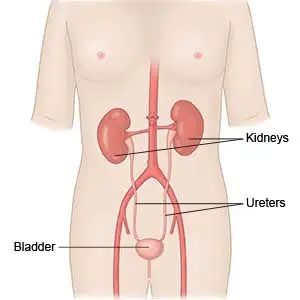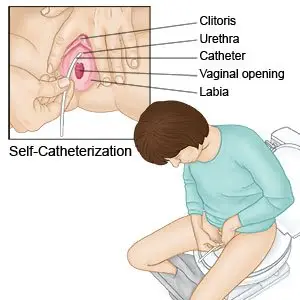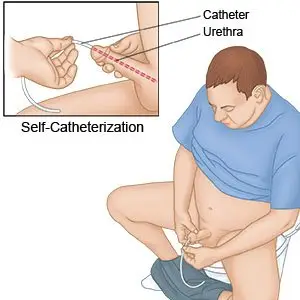What is neurogenic bladder?
Neurogenic bladder is a condition that causes loss of bladder function. It is usually caused by disease or by damage to your nervous system. Neurogenic bladder may cause urinary incontinence (trouble controlling urination) or urinary retention (trouble urinating).
 |
What are the signs and symptoms of neurogenic bladder?
- Loss of feeling that your bladder is full
- Urinary incontinence
- Urinary frequency (urinating often)
- Urinary urgency
- Urinating a small amount or not completely emptying your bladder
- Urine that dribbles out or leaks
- Urinary tract infections (UTI) that come back even after treatment
How is neurogenic bladder diagnosed?
Your healthcare provider will examine you. Tell him or her about your symptoms and when they started. You may need the following tests:
- Blood and urine tests will show how well your kidneys are working and if you have an infection.
- An x-ray, ultrasound, CT, or MRI may show how much urine your bladder can hold. You may be given contrast liquid to help the bladder show up better in the pictures. Tell the healthcare provider if you have ever had an allergic reaction to contrast liquid. Do not enter the MRI room with anything metal. Metal can cause serious injury. Tell the healthcare provider if you have any metal in or on your body.
- A cystoscopy allows your healthcare provider to look inside your bladder. A flexible tube with a camera on the end will be put into your urethra and moved up to your bladder.
- Urodynamic testing helps show how much fluid your bladder can hold and if your bladder empties completely.
How is neurogenic bladder treated?
Treatment will depend on your symptoms and underlying condition. You may need any of the following:
- Medicines can help control your bladder. You may also be given antibiotics to prevent or treat a bacterial infection.
- Surgery may be needed if other treatments do not work.
Treatment options
The following list of medications are in some way related to or used in the treatment of this condition.
- Botox
- solifenacin
- VESIcare LS
- Ed-Spaz
- Levsin
View more treatment options
How can I manage my symptoms?
- Train your bladder. Go to the bathroom at set times, such as every 2 hours, even if you do not feel the urge to go. You can also try to hold your urine when you feel the urge to go. For example, hold your urine for 5 minutes when you feel the urge to go. As that becomes easier, hold your urine for 10 minutes.
- Empty your bladder with a catheter. Healthcare providers will teach you how to safely use a catheter at home.


- Keep a urinary incontinence (UI) record. Write down how often you leak urine and how much you leak. Make a note of what you were doing when you leaked urine. Bring the record to your follow-up appointments.
- Drink liquids as directed. Ask how much liquid to drink each day and which liquids are best for you. Limit caffeine. Caffeine may irritate your bladder.
When should I seek immediate care?
- You cannot urinate.
- You see blood or clots in your urine.
- You have severe back or abdominal pain that does not go away with treatment.
When should I call my doctor?
- You have a fever and chills.
- You have nausea or are vomiting.
- You feel burning when you urinate.
- You have pain in your abdomen or lower back.
- You have bladder spasms.
- You are urinating less than usual for you.
- You have questions or concerns about your condition or care.
Care Agreement
You have the right to help plan your care. Learn about your health condition and how it may be treated. Discuss treatment options with your healthcare providers to decide what care you want to receive. You always have the right to refuse treatment. The above information is an educational aid only. It is not intended as medical advice for individual conditions or treatments. Talk to your doctor, nurse or pharmacist before following any medical regimen to see if it is safe and effective for you.© Copyright Merative 2023 Information is for End User's use only and may not be sold, redistributed or otherwise used for commercial purposes.




